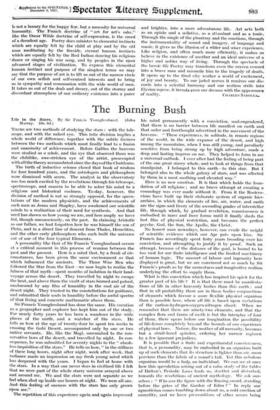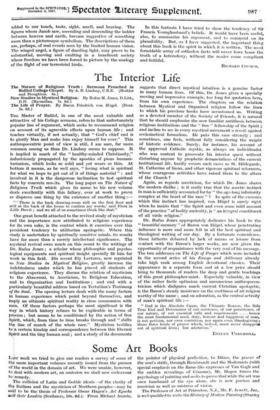The Burning Bush
THERE are two methods of studying the stars : with the tele- scope, and with the naked eye. This trite division implies a whole world of difference, together with the subtle liaisons between the two methods which must finally lead to a fusion and unanimity of achievement. Before Galileo the heavens were studied as a whole, and the eye that observed them was the childlike, awe-stricken eye of the artist, preoccupied with all the theory accumulated since the days of the Chaldeans.
The birth of inductive science closed that book of wisdom for four hundred years, and the astrologers and philosophers were dismissed with scorn. The analyst in the observatory was too much excited by the revelations through his telescope, spectroscope, and camera to be able to sober his mind to a religious and historical coolness. To-day, however, the division of method is not so strongly opposed, for the specu- lations of the modern physicists, and the achievements of such men as. Jeans and Shapley, have awakened our scientific minds to a realization of their need for synthesis. And that need has shown us how young we are, and how amply we have fed, though unconsciously, on the past. In claiming Aristotle as our father, we had forgotten how he was himself the son of Plato, and in a direct line of descent from Thales, Heraclitus, and the other early philosophers who each built the universe out of one of the four typical Elements.
A personality like that of Sir Francis Younghusband occurs at a critical moment in this process of reunion between the past and the present. Here is a mind that, by a freak of cir- cumstances, has been given the same environment as that which influenced the ancients. The Three Wise Men who followed the Star from the East—we now begin to realize the fulness of that myth—spent months of isolation in their land- voyage across the desert. They travelled by night to escape the heat, and above them the vault of stars burned and pulsed, unobscured by any film of humidity in the cool air of the desert night. They trusted to the constellations for guidance, and submitted their souls in humility before the awful spectre of that living and concrete mathematic above them.
Sir Francis Younghusband has done the same. His vocation as a geographer and explorer has kept him out of the study. For nearly forty years he has been a wanderer in the wide places of the earth, and a watcher of the stars. He tells us how at the age of twenty-four he spent ten weeks in crossing the Gobi Desert, accompanied only by one or two native servants. He, like the Magi, succumbed to the con- servative laws of the desert, and travelled by night. In con- sequence, he was submitted for seventy nights to the " abash- less-inquisition of the stars." He tells us how, " in the stillness of these long hours, night after night, week after week, that radiance made an impression on my fresh young mind which has deepened with the years. I began to feel at home with the stars. In a way that one never does in civilized life I felt that we were part of the whole starry universe arrayed above and around me. We and the stars were not separate as we feel when shut up inside our houses at night. We were all one. And- this-feeling of oneness with the stars has only grown upon me."
The repetition of this experience again and again impressed his mind permanently with a conviction, soul-engendered, that there is no barrier between life manifest on earth and that order and forethought advertised in the movement of the heavens. " These experiences, in solitude, in remote regions of the world, in the wide expanse of the 'desert, and high among the mountains, when I was still young, and peculiarly sensitive from being strung up by high adventure, made a deep and lasting impress on mc. They helped to form in me a universal outlook. I ever after had the feeling of being part of the one great starry whole, and to look at things from that standpoint. I belonged to this earth—to this star. But I belonged also to the whole galaxy of stars, and was affected by them in a most soothing and elevated way."
Here is no new emotion. It is that which holds the foun- dation of all religions ; and no brave attempt at creating a cosmology was ever made without it. From it the Rosieru- .
cians have built up their elaborate system of organic hier- archies, in which the elements of fire, air, water, and earth are the signs and livery of the ascending grades of interstellar life, through which, by gradual revelation, consciousness is embodied in rarer and freer forms until it finally sheds the last film of physical restriction, and becomes the perfect psyche, God, the Sun, the Apollo, the Christ.
No honest man nowadays, however, can evade the weight of scientific evidence which our Age puts upon him. Sir Francis has accordingly spent forty years brooding over his
conviction, and attempting to justify- it by proof. Such an attempt, because of the distance of the goal, is bound to be
too vast for our finite intelligence and the limited machinery of human logic. The amount of labour and ingenuity here displayed is great, but we are convinced not so much by Sir Francis's proofs as by the earnestness and imaginative realism underlying the effort to supply them.
What is this conviction which has inspired his spirit for the greater part of his life ? It is that there must be manifesta- tions of life in other heavenly bodies than this earth ; and that in all probability there are in these bodies conjunctions of -elements which favour a more flexible physical organism than is possible here, where all life is based upon variations of the carbon-hydrogen-oxygen-nitrogen chord-. When we remember that there are ninety-two elements, and that the complex flora and fauna of earth is but the interplay of four
of them, there opens before our imagination the possibility of life-forms completely beyond the bounds of our experience
of physical laws. Nature, the mother of all necessity, becomes but a strait-laced spinster, ordering her narrow regimen by a few ignorant prejudices..
It is possible that a finite and experimental consciousness, that is, a personality, may be embodied in an organism built up of such elements that its structure is lighter than air, more pervious than the fabric of a comet's tail. Yet this nebulous organism would be a body, an individual. We can sec at once how this speculation arising out of a calm study of the tables of Dalton's Periodic Laws leads us, startled and disturbed, towards the revelations of ancient mythology. We ask our- selves : " Who was the figure with the flaming sword, standing ' before the' bates of the Garden of Eden ? " In reply our agnosticism comes tumbling down about us, a cold erection of unreality, and we have premonitions of other senses being added to our touch, taste, sight, smell, and hearing. The figures whom Jacob saw, ascending and descending the ladder between heaven and earth, become guggestive of something more than a picturesque symbolism. The-descriptions of them are, perhaps, of real events seen by the limited human vision. The winged angel, a figure of dazzling light, may prove to be substantial, moving and exulting in a beneficent society whose freedom we have been forced to picture by the analogy of the flight of our terrestrial birds. In this fantasia I have tried to show the tendency of Sit Francis Younghusband's beliefs. It would have been useful, also, -Co summarize his argument, and to comment on its plausibility. But, as I have suggested, the important thing about this book is the spirit in which it is written. The most formidable array of orthodox facts will never force home the truth of a heterodoxy, without the reader come compliant and faithful.
RientAnn











































































 Previous page
Previous page